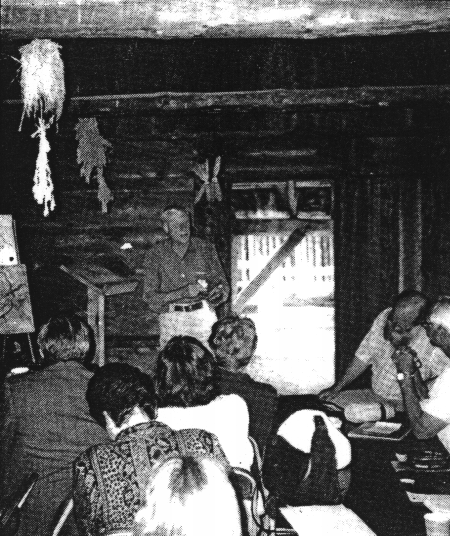by Ed Pelletier
Free Press Special
Friday June 25, 1999
It has been 350 years since historical events took place in Huronia that have forever shaped our community.
History was made again in Huronia on the weekend of June 4-6, 1999.
For the past two years, a local group called the Huronia Reconcilliation Committee has been working together, contacting the descendants of the people involved in the early history of Huronia, from the 1600’s to the 1800’s.
Representatives of the French, British, Jusuits, Hurons, Iroquois, and the government as well as the Wyandotte Indians, Wyandots and Dutch were involved.
Three weekends ago, representatives from each of the groups came together in Midland for a weekend of talking, listening and learning, which led to repentance, forgiveness and reconciliation among all involved.
The gathering began at the Best Western Highland Inn on Friday morning, then moved to the Huron-Ouendat Indian Village and Huronia Museum. Then it moved to Sainte-Marie Among the Hurons.

We have, after all, preserved 350-plus years of history through the Indian Village, Ste.-Marie and the Martyr’s Shrine.
Friday was a day of learning and revisiting the hisotry of Huronia. Saturday at the higland was a day of learning what repentance, forgiveness and reconciliation are all about – and then putting it into action. Sunday was a day of gift-giving between each of the representatives, and the signalling of new friendships, understanding and new beginnings.
The purpose of the reconciliation ceremony was to gring together descendants or representatives of those who were players in Huronia’s history when there was so much turmoil, unrest, upheaval and bloodshed between various groups.
It was the intent that any and all walls, barriers and divisions of the past be dealt with through repentance and forgiveness.
Forgiveness was given and received by all. Healing was brought to and experienced by all. New covenants were formed.
Among those attending were Elijah Harper, former cabinet minister in the government of Manitoba who now works privately on Indian claims and rights.
(It was Mr. Harper, holding a sacred eagle’s feather, who voted against giving introduction of the Meech Lake constitutional accord required unanimous cosent to be introduced to the floor of the Manitoba legislature in 1990; that act made moot Newfoundland’s refusal to sign the accord without the hasty calling of a provincial refoerendum on the issue, and killed the accord; the two provinces were the only ones who failed to approve Meech.)
Also speaking were Adrian Jacobs, a professor, member of the Canadian Aboriginal Task Force, and diretor of First Nations Centre for Ministry, John Steckly, a professor and author; Charlie Garrad, an archaeologist and excavator of native Indian sites; Brenda Nadjwan, Intergovernmental Affairs and Indian Affairs, and Peggy Kennedy, who has been involved with leadership development and First Nations issues since 1965.
Five Indian chiefs were there from Quebec, Kansas, Oklahoma, the Wyandot Tribe and the Six Nations Grand River Iroquois Nation.
Also attending were the mayors of Midland, Pentanguishene and Tay Township, Pierre Lefaive, of Ste.-Marie and Jamie Hunter of the Huronia Museum were also in attendance.
Members of the clergy attended. Facilitators of the event were Rev. Brent Farquhar of the Midland Alliance Church and Adrian Jacobs, executive director of the First Nations Centre for Ministry in Belleville.
The Huronia Reconciliation Committee includes Felicia Buchholz, June Bertsch, Ann Karel, Debbie Wright, and Ed Pelletier.
Editor’s Note: Ed Pelletier is of French, British and Sioux descent. Mr. Pelletier explains that the group considered having media coverage of the event but some participants, citing the extreme solemnity of the ceremony itself, were not comfortable with it. Therefore, he explains, no media were contacted. He submitted this article for publication.